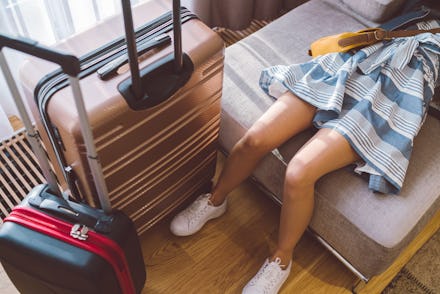The scientific reason why going back to real life after vacation is so painful

My partner and I recently returned from Japan, probably the best trip we’ve taken yet. We rolled in and out of bed whenever we pleased, and spent our waking hours savoring gorgeous views and devouring sashimi. When we returned to the States, the abrupt shift from vacation to work mode left me disoriented, and frankly, kind of sad. The morning after we landed, I sighed as I served myself oatmeal, checked email on my phone, and reminisced about how just two days ago, I’d been sipping hot sake at the peak of Mount Inari in Kyoto, after hiking through rows of crimson shrine gates. In other words, I was deep in the bowels of your classic travel hangover.
A travel hangover, also known as the post-vacation blues, is basically that bummed-out feeling you experience after returning from a trip, likely accompanied by difficulty re-adjusting to regular, everyday life — and research says it’s a real thing (and not just you being a baby). In a 2010 study, happiness levels of participants who had gone on vacation dipped back down not too long after they returned from their trips to those of participants who had stayed home.
What causes a travel hangover, though? “A lot of it has to do with time zone changes,” Stewart Shankman, chief of psychology at Northwestern University Feinberg School of Medicine, tells Mic. Many of your bodily systems follow a daily pattern based on your internal clock, or circadian rhythm. These include your nervous system and endocrine system (the set of glands that produce and release hormones). So when your circadian rhythm gets thrown off — such as when you travel across time zones — your mood does, too. This can happen even if you don’t cross time zones, but you get into the habit of sleeping and waking up late. “Even if you didn’t technically travel across time zones, your body kind of felt like it did,” Shankman explains.
The good news is, you can take steps to ease your body’s transition back to the rhythms it normally follows at home and alleviate a travel hangover after your trip, or even take preemptive measures beforehand to minimize it, Shankman says. Here’s how:
Don't force the bounce-back
Adjusting your sleep cycle can help get your circadian rhythm back on track, but be patient; Shankman says it takes about a day to shift your sleep cycle by one hour. On your first night back, rather than forcing yourself to sleep, say, three hours earlier than you would’ve while on vacation, start by going to bed one hour earlier. The following night, go to bed an hour earlier than you did the first night, and so on, until you’re back to where you need to be.
Take the same approach at the beginning of your trip to make the switch back to daily life seem less stark, Shankman says. “It can also make the vacation more enjoyable, so you don’t have to waste the first day or two being totally thrown off.”
The same goes for your social life
Chances are, you typically reserve socializing for the evenings after work, but on vacation, you probably socialize earlier and more often. Gently ease back into your normal social rhythm. “For people who are partying and letting loose while on vacation, don’t go back cold turkey to work, work, work,” Shankman says. For instance, if your body is used to socializing at 6:00 p.m. instead of the usual 9:00 p.m., split the difference and meet up with a friend at 7:00 p.m.
Be intentional about your diet
You probably see vacation as a time to indulge — which can make it harder for your body to readjust to its normal diet post-vacation, Shankman says, adding that research has shown that diet can impact your gut bacteria, which, in turn, can cross into your brain and affect your mood. (For instance, NPR reports that one recent study suggests following a Mediterranean diet can lower depression symptoms.) In addition to clocking in enough sleep, a healthy diet rich in fruits and vegetables can help keep mood disturbances at bay, Shankman notes.
Monitor your mood, especially if you manage depression
If you’ve been diagnosed with depression or bipolar disorder, you may be especially sensitive to shifts in your circadian, social, and other rhythms, Shankman explains. According to one heavily-researched theory, when these rhythms get thrown off in such individuals they may experience relapses of their depression or bipolar disorder — not just your garden variety travel hangover.
Travel can be rejuvenating, but if you have these conditions, it may also carry the risk of relapse, Shankman says. Another point to keep in mind: If your post-vacation blues centers around the dread of returning to work or a relationship, it's worth talking to a therapist about how to address or adjust a life issue that you may have temporarily escaped.
My travel hangover hit its lowest point on my first day or two back from Japan, but my mood has definitely improved as my sleep schedule has returned to normal. A week out from my return, I feel as happy as I did before my trip, and now I’m anticipating the next one.